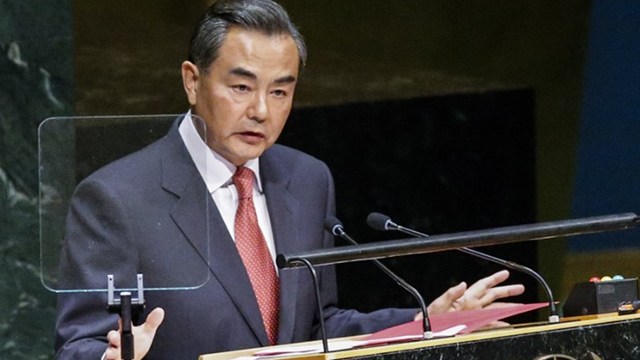SUMMARY
This is AI generated summarization, which may have errors. For context, always refer to the full article.

UNITED NATIONS – The country accused of failing to abide by international law in its massive claim on the South China Sea urged the international community to use “fair and just rules” in settling disputes.
China’s Foreign Minister Wang Yi stressed the importance of using international law in resolving global problems like crises in Gaza, Iraq, the Central African Republic and South Sudan.
Wang addressed the annual debate of the UN General Assembly in New York on Saturday, September 27, where he said that “principles of sovereignty and territorial integrity must be upheld.”
“We should uphold justice. It is imperative to promote greater democracy and rule of law in international relations, use fair and just rules to tell right from wrong and settle disputes, and pursue peace and development within the framework of international law,” Wang said in Chinese.
Wang did not raise in his speech China’s maritime dispute with some Southeast Asian nations over the South China Sea but outlined Beijing’s approach to international cooperation. Claimant countries like the Philippines and Vietnam have expressed concern about China’s growing aggression in the region.
“The pursuit by different countries of economic and social development must be respected. Their right to independently choose their social systems and development paths must be safeguarded,” Wang said.
In contrast, Vietnam’s Deputy Prime Minister Pham Binh Minh mentioned outright Hanoi’s territorial dispute with China in his speech minutes after Wang’s address.
Tensions rose between China and Vietnam after Beijing deployed an oil rig in waters Hanoi claims in early May. This set off protests and riots targeting Chinese-owned factories in Vietnam, and analysts said it caused the worst breakdown in Sino-Vietnam relations since the two countries fought a brief border war in 1979.
Minh said that the potential escalation of territorial and sovereignty disputes is challenging international peace and security.
He said that Vietnam abides by the 1982 UN Convention on the Law of the Sea (UNCLOS), which entitles coastal states to a 200-nautical mile Exclusive Economic Zone within which they can exploit living and non-living resources. International scholars said China’s so-called 9-dash line claim is inconsistent with UNCLOS.
Minh said, “It is our consistent principled position to respect the sovereignty and territorial integrity of all states, and to settle international disputes and conflicts, including the East Sea (South China Sea) issue, by peaceful means, in accordance with international law.”
Minh also mentioned efforts of small claimant countries from Southeast Asia to get China to agree to a legally binding document on the South China Sea. In 2002, China and Southeast Asian countries signed a non-binding agreement stating that parties must resolve disputes by peaceful means, and “exercise self-restraint in the conduct of activities that would complicate or escalate disputes.”
“Vietnam abides by the Declaration on the Conduct of Parties in the South China Sea and works to secure an early adoption of the Code of Conduct of Parties in the South China Sea,” said Minh.
The Philippines, which filed a historic arbitration case against China before a UN-backed tribunal, is scheduled to address the assembly on Monday, September 29.
US President Barack Obama commented on the disputes in his own speech on Wednesday: “We will insist that all nations abide by the rules of the road, and resolve their territorial disputes peacefully, consistent with international law. That’s how the Asia Pacific has grown. And that’s the only way to protect this progress going forward.”
‘History is not be falsified’
Wang also took a swipe at Japan for alleged historical revisionism on World War II.
Last year, China criticized Japanese Prime Minister Shinzo Abe for visiting the Yasukuni Shrine, which honors Japan’s war dead including convicted war criminals. South Korea also protested the move while the US expressed disappointment.
“The historical facts are perfectly clear, and a final verdict has already been pronounced on what was right and what was wrong. History is not to be falsified, and truth is not to be distorted. Today, 70 years later, let us jointly uphold human justice and conscience so that those who attempt to deny aggression and distort history will have nowhere to hide and achieve nothing,” Wang said.
Earlier this week, Abe renewed his call for a summit with China in November to ease tensions after the shrine episode, and the territorial dispute over the Senkaku islands in the East China Sea.
Airstrikes must have UN backing
Wang also had criticism for the US concerning its airstrikes against the terrorist group Islamic State of Iraq and Syria (ISIS) in Syria, which lacked the backing of the UN Security Council and government of Bashar al-Assad.
“Coercive action should have the authorization of the Security Council. If a country places its domestic law above international law and interferes in other countries’ internal affairs at will or even seeks regime change, the legitimacy of its action cannot but be questioned by the international community,” Wang said.
Along with Russia, China is a permanent member of the UN Security Council. The two allies will likely veto any resolution authorizing the airstrikes in Syria.
Wang then gave a statement that was similar to China’s previous messages to the US warning it not to meddle with the South China Sea issue.
“When conducting mediation, the international community should uphold justice and take an objective and balanced position. Countries should not be partial to any party in the conflict. Still less should they pursue their own agenda through their involvement.” – Rappler.com
Rappler multimedia reporter Ayee Macaraig is a 2014 fellow of the Dag Hammarskjöld Fund for Journalists. She is in New York to cover the UN General Assembly, foreign policy, diplomacy, and world events.
Add a comment
How does this make you feel?
There are no comments yet. Add your comment to start the conversation.